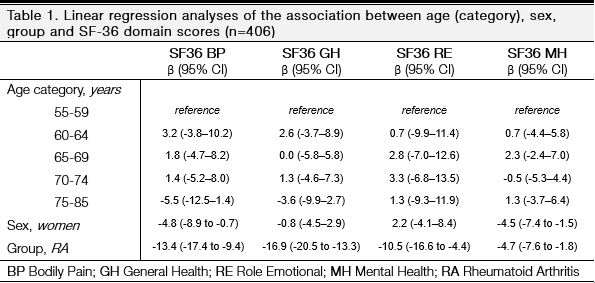Session Information
Date: Monday, October 27, 2025
Title: (1306–1346) Rheumatoid Arthritis – Diagnosis, Manifestations, and Outcomes Poster II
Session Type: Poster Session B
Session Time: 10:30AM-12:30PM
Background/Purpose: As the population ages, rheumatologists will increasingly care for older persons with rheumatoid arthritis (RA). Aging comes with specific challenges of which rheumatologists are currently insufficiently aware. Among others, there is limited understanding of how older age affects aspects of Health-Related Quality of Life (HRQoL) and whether the impact of age is different compared to controls.
Methods: Cross-sectional data of patients with RA and population controls without inflammatory rheumatic disease aged 55–85 years from the STudying Aging in Rheumatoid arthritis (STAR) study was used. HRQoL was assessed by the eight domains of the self-reported 36-item Short Form (SF-36) Health Survey Questionnaire (score 0–100: 0=worst, 100=best). Linear regression was used to test potential interactions between five age categories (ref 55–59 years) and group (RA/control), while adjusting for sex, with pinteraction<0.10 considered statistically significant. In subsequent multivariable linear regressions, body mass index (BMI), the no. of self-reported painful joints (Rheumatoid Arthritis Disease Activity Index (RADAI); score 0–48), physical function (Health Assessment Questionnaire (HAQ); score 0–3) and comorbidities (Charlson Comorbidity Index (CCI); score 0, 1, ≥2) were added to explore potential confounding of age category and group.
Results: A total of 406 participants were included: 197 patients with RA (mean age 68±7, 62% women) and 209 population controls (mean age 68±7, 60% women). Across all eight HRQoL domains, patients with RA reported lower scores than controls (~10–20 points lower on average). For bodily pain (BP), general health (GH), role emotional (RE) and mental health (MH), no differential effect of age category between patients and controls were observed (pinteraction≥0.10) (Table 1). For physical functioning (PF), role physical (RP), social functioning (SF) and vitality (VT), interactions between RA/control and age categories were significant. Scores for PF and SF tended to be worse in patients with RA aged 75–85 years compared to the youngest group, but remained unchanged (PF) or even improved (SF) in controls aged 70–74 years (Table 2). No effect of age on scores for RP and VT were observed in patients, while better scores with increasing age were observed in controls, specifically in those 70–74 years. After adjusting for health-related confounders, the impact of RA on RE, MH, BP and GH reduced or disappeared, and a positive age effect emerged in those aged 75–85 years for MH and 70–74 for BP (data not shown). For domains that had to be stratified, the effect of age was (i) attenuated for PF among RA patients, (ii) unchanged for VT and SF in patients and controls and (iii) stronger for RP in controls aged 75–85 years.
Conclusion: These findings suggest that age-related changes in HRQoL differ between patients with RA and controls, by age category, and SF-36 domain. Older RA patients begin at a lower baseline, experience a decline in physical functioning, and miss the age-related improvements seen in controls in role physical, vitality and social functioning. Clinicians should more aware of these differences and gain more attention on supporting psychosocial well-being in older patients with RA.
To cite this abstract in AMA style:
Truijen S, Boonen A, Ramiro S, van Onna M. The Impact of Age on Health-Related Quality of Life in Patients With Rheumatoid Arthritis Compared to Population Controls: A Cross-Sectional Analysis [abstract]. Arthritis Rheumatol. 2025; 77 (suppl 9). https://acrabstracts.org/abstract/the-impact-of-age-on-health-related-quality-of-life-in-patients-with-rheumatoid-arthritis-compared-to-population-controls-a-cross-sectional-analysis/. Accessed .« Back to ACR Convergence 2025
ACR Meeting Abstracts - https://acrabstracts.org/abstract/the-impact-of-age-on-health-related-quality-of-life-in-patients-with-rheumatoid-arthritis-compared-to-population-controls-a-cross-sectional-analysis/


.jpg)